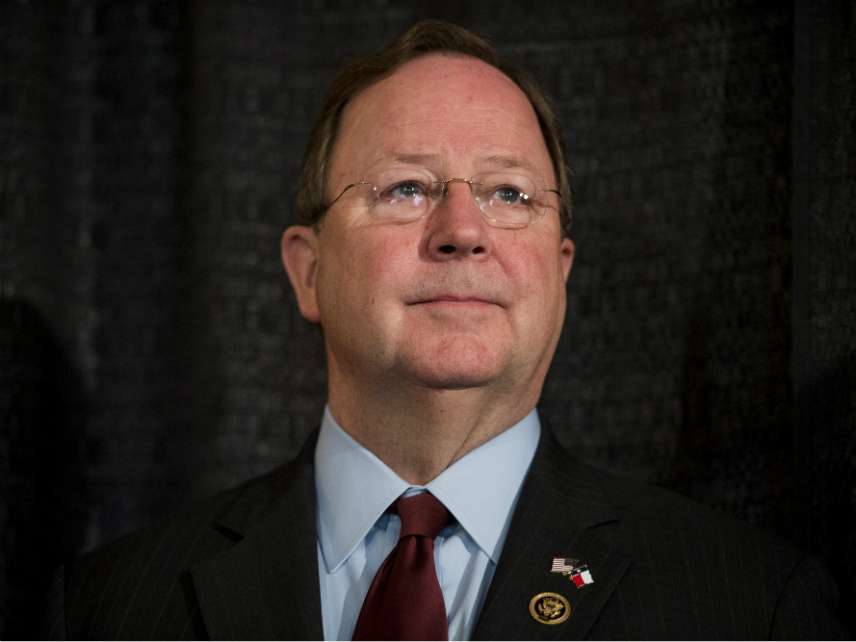Republicans Get Behind Gun Control in Wake of Las Vegas Shooting
Get your bump stocks while you can.

In the wake of the horrendous shooting in Las Vegas that left 59 people dead and over 500 injured, a chorus of gun control advocates have been demanding the government just "do something" to stop mass shootings.
It looks as though politicians from both major parties have decided that something is a ban on bump stocks, until this week a device little known outside of gun enthusiast circles. Officers who stormed the hotel room of Las Vegas shooter Stephen Paddock found several rifles equipped with bump stocks among his arsenal.
Small surprise given her long and storied career as a gun-grabber, Sen. Diane Feinstein (D–Calif.) has introduced a bill that would make illegal the devices, that greatly increase the rate you can fire a semi-automatic weapon.
Feinstein was the chief architect of the 1994* "assault weapons" ban, and her 2013 update to that legislation contained a prohibition on bump stocks. The scale of the bloodshed in Las Vegas, she says, justifies a ban now.
"The only reason to fire so many rounds so fast is to kill large numbers of people. No one should be able to easily and cheaply modify legal weapons into what are essentially machine guns," said Feinstein in a statement.
What might seem a bit more surprising are the Republicans getting behind her effort. U.S. Rep. Bill Flores of Texas, a professed gun owner, has said he would support a federal bump stock prohibition. "Based on the videos I heard and saw, and now that I've studied up on what a bump stock is — I didn't know there was such a thing — there's no reason for it," Flores told The Hill.
Sen. Ron Johnson (R–Wis.), chairman of the Senate Homeland Security Committee, claimed total ignorance of bump stocks until Monday, said he will "likely" support a ban.
Plenty of other Republican lawmakers are now leaving open the possibility for a bump stock ban, without committing themselves to vote for it quite yet.
Sen. Lindsay Graham (R–S.C.) released a statement saying, "I think it'd be a good time to have a hearing. Just to find out how does the technology work and is there a legislative solution?"
Sens. John Conyers (R–Texas) and Chuck Grassley (R–Iowa) have likewise supported hearings on bump stocks. Sen. John Thune (R–S.D.) said a bump stock ban was something Congress should "look into." And Sen. Jeff Flake (R–Ariz.) wouldn't rule out such a prohibition.
It's probably not unfair to see such wishy-washy utterances from normally staunch Second Amendment supporters as a way of determining which way the public wind is blowing on gun control. A ban on something relatively few people know about might spare Republicans from having to answer for not doing more.
There are signs they might not pay a political penalty for doing it. Conservative blogs Hot Air and Red State have opined that bump stocks are not a hill worth dying on. Conservative columnist Bret Stephens has made his defection to the liberal The New York Times complete by calling for the total abolition of the Second Amendment.
So far, the National Rifle Association has been silent.
Just because a bump stock ban is gaining popularity doesn't make it good policy. Reason's Jacob Sullum has questioned the role bump stocks played in the death toll, noting a tradeoff between speed and accuracy.
Nick Gillespie also reminds us of the perils of policy-making in the aftermath of a major catastrophe like the one that took place in Las Vegas Sunday night:
It's wrong, I think, to immediately pivot to what are inevitably pushed as "common-sense" policy responses to gun attacks, such as banning "assault weapons" (a class of guns that doesn't really exist, have been banned in the past with no impact on violence, and detract from other, arguably more effective regulations). Thoughts of tearing up the Constitution clearly come more from the heart than the head and should be resisted until the passions calm at least a little. If hard cases make bad law, then public tragedies make terrible policy, whether we're talking about mass shootings, acts of terrorism, or celebrity drug overdoses.
Political expediency aside, Libertarians and gun rights advocates of all political stripes have a reasonable fear that any gun control measures enacted after a crisis will lead to more regulations, more erosion of constitutionally protected rights, and the criminalization of law-abiding citizens.
UPDATE: House Speaker Paul Ryan has now expressed his openess to a bump stock ban, CNN reports. In a Thursday interview with conservative MSNBC Hugh Hewitt, Ryan said that a bump stock "allows you to take a semiautomatic and turn it into a fully automatic so clearly that's something we need to look into."
CORRECTION: The original version of this article stated that the federal assault weapons ban was passed in 1996.
Rent Free is a weekly newsletter from Christian Britschgi on urbanism and the fight for less regulation, more housing, more property rights, and more freedom in America's cities.


Show Comments (184)